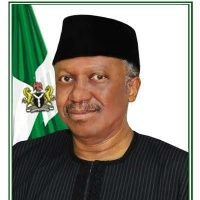Health
Nigeria Ranks High in TB Infection Despite Free Testing, FG Laments

By Laide Akinboade, Abuja
The Federal Government has expressed dismay with the country’s position in the recent World Health Organization’s Tuberculosis ranking.
“It is unfortunate that despite the availability of free testing and medication, Nigeria still ranked highest among countries in the world with TB especially among children,” Health Minister Osagie Ehanire, told a press conference organized on Friday, to commemorate the 2023 world TB day.
In the WHO’s global TB report, Nigeria ranks as the 6th country in the world and the first in Africa with the highest number of people infected with TB. It is also included among the 8 countries that have two-thirds of global TB cases.
According to Osagie who was represented by the State Minister of Health Ekumankama Joseph, Nigeria’s position on the ranking was a result of various negative factors:
“There are 467,000 TB cases in Nigeria in 2021. In 2022 there was an estimated 479,000 TB cases in Nigeria out of which 285, 562 were notified. In 2022, there is an estimated 3,932 Drug Resistance Tuberculosis cases were diagnosed and 3,185 (81%) were enrolled on second-line treatment,” he said.
The Minister further said the problems were compounded by the citizens’ ignorance of the TB virus. “Only one out of every four Nigerians has adequate knowledge about TB.”
However, the minister said the country recorded some improvement in the area of Human Immunodeficiency Virus (HIV) testing among TB patients as 97% of Nigeria’s TB patients have documented HIV results, which was far higher than the global and African region averages of 76% and 89% respectively.
“The federal government is committed to ensuring the end of TB in Nigeria. All the interventions of the Federal Government are yielding positive results. We have been able to expand the TB facilities from 2, 038 in 2014 to over 20, 000,” he said.
The Minister also called on Nigerians to take an active role in ending the transmission of Tuberculosis in the country. “If you or anyone you know is coughing for more than two weeks ensure that you get tested,” he advised.
Also Speaking, the WHO’s Country Representative (WR) Dr. Walter Mulombo, represented by Dr. Laxmikant Chavan WHO’s Technical Officer said that Nigeria at the United Nations High-Level Meeting (UNHLM) on TB in 2018 made a commitment to diagnose and treat 1,109,000 TB cases and place 2,183,890 clients on TB preventive Therapy (TPT) from 2018 to 2022.
“But after the end of 2022, Nigeria is yet to achieve this commitment as available reports show that the country is trailing behind in all the set targets,” he said.
He noted that TB control budgets in Nigeria continue to be drastically underfunded.
“About 69% of the TB budget in 2021 was unfunded, this is a major threat to the country’s efforts in achieving the set targets. Too many people are pushed into poverty when they contract TB due to lost income, transport costs, and other expenses. 71% of the TB patients in Nigeria and their households are affected by catastrophic cost due to TB.”
Dr. Walter reiterated WHO’s continued support to Nigeria in developing and implementing guidelines, plans, frameworks, and strategic documents to end the TB epidemic in Nigeria.
“In addition, we will facilitate research to provide evidence-based interventions and innovations for finding the missing TB cases and enhancing the country’s efforts in reaching the set targets. We will continue to work with the programme to build the capacity of senior and middle-level managers across the states on the needed knowledge and skills for improving quality of care and data analysis towards formulating evidence-based policies for enhancing programme performance at all levels. In addition, we will continue to support monitoring of the programme at all levels, in real-time, to identify challenges and advise on strategies to address the challenges,” he said.
Also, the Deputy Director, Office of HIV/ AIDS and TB USAID Nigeria, Omosalewa Oyelaran said since 2003, Nigeria remains in the top 10 countries affected by TB, with one of the lowest detection rates globally.
She said to combat this debilitating disease; USAID collaborates with the Government of Nigeria and other national and international partners to support the National Tuberculosis Program. Since 2003, USAID has contributed more than $250 million to TB control efforts in Nigeria.
In 2022 alone, USAID programs helped screen over 15 million individuals for TB. USAID’s support also includes the provision of TB screening, diagnostic, treatment, and preventive services in 18 states through community and facility-based interventions.
“In partnership with the Government of Nigeria, USAID’s ‘TB Accelerator’ model invested in local civil society organizations (CSOs) to increase access to quality TB prevention, diagnosis, and treatment, including multi-drug resistant TB.
“These local CSOs collaborate with the national and state TB programs to deploy, and scale, state-of-the-art equipment and tools to improve the detection of TB. USAID also facilitates multi-sectoral public-private partnerships to increase public awareness and advocate for domestic resources to address the TB epidemic in Nigeria. As a result, Nigeria realized a significant increase in TB case finding and treatment coverage over the past three years.
“Despite the additional challenges posed by the COVID-19 pandemic, we have achieved significant results working together in partnership with GON and Global Fund.
“We commend the Government of Nigeria’s efforts to sustain the accelerated service delivery that resulted in yearly case notification increases of 160 percent between 2019 and 2022.
“However, much remains to be done if Nigeria is to meet its TB control target of ending the TB epidemic by 2035. We must continue to work together to reach all TB patients and their contacts in Nigeria.
“However, the greatest challenge is the funding gap, which is estimated to be 70 percent of the resources needed to effectively control TB. Therefore, I call on you to mobilize domestic resources to meet this funding gap through budgetary allocations, the inclusion of TB services in health insurance schemes, and enhanced private sector engagement”, she said.
The Ag. Board Chair, Stop TB Partnership Nigeria, Dr. Queen Ogbuji in her goodwill message said out of the annual estimate of 479,000 TB cases in Nigeria, only 285,561 were notified.
According to her, it’s good progress in the right direction, considering the fact that Nigeria was able to increase its notification even when the world was grappling with COVID-19 and many countries of the world had low case notification and more TB deaths.
The increase has been consistent since then and Nigeria needs to be applauded for this. However, a lot needs to be done to close the gap. While we commemorate, let it remain top in our minds the picture that Nigeria ranks first in Africa and sixth in the world accounting for about 4.6% of the global TB burden
“TB disease is often more severe in children with higher mortality among those less than 5 years old. The notification of children with active TB disease has remained abysmally low at only 6% of the annual notification.
“As the country continues to make progress to find the missing TB cases and put them on treatment, many resources are needed to accomplish this, unfortunately, of the $373 million needed for TB control in Nigeria in 2020, only 31% was available and 24% of this came from the donors, only 7% was from domestic source”, she added.
Health
World Bank, Partners Record Progress Toward 1.5bn Healthcare Goal

The World Bank Group, global partners and countries on Saturday announced continued progress toward the goal of delivering affordable and quality health services to 1.5 billion people by 2030.
A statement by the World Bank Online Media Briefing Centre said 15 countries introduced National Health Compacts, outlining practical five-year reforms aimed to expand primary healthcare, improve affordability and support job-rich economic growth.
The statement said that since the goal was set in April 2024, the Bank and partners had supported countries to provide quality and affordable care to 375 million people.
It said work was underway with roughly 45 countries to scale proven primary care approaches that strengthen health outcomes while generating employment across health workforces, local supply chains and supporting industries.
“This progress comes as governments confront aging populations, rising chronic disease, and financial pressures.”
The statement said the 2025 Global Monitoring Report released at the Tokyo Universal Health Coverage (UHC) High-Level Forum showed that 4.6 billion people globally still lacked access to essential health services.
It said the report also revealed that 2.1 billion people faced financial hardship due to health expenses.
“These challenges underscored the need for long-term, coordinated reforms that help countries build more resilient and equitable health systems.”
World Bank Group President, Ajay Banga, is quoted in the statement as saying, “strong primary healthcare systems are central to both health protection and economic growth.
“Strong primary health systems do more than safeguard health, they support jobs and economic opportunity.
“Countries are stepping forward with clear priorities, and we are working alongside them to deliver practical solutions at scale.”
According to the statement, the 15 countries that introduced National Health Compacts at the forum in Tokyo are Bangladesh, Egypt, Ethiopia, Fiji, Indonesia, Mexico, Morocco, Nigeria, Philippines, Sierra Leone, Syria, Tajikistan, Uganda, Uzbekistan and Zambia.
The statement said the compacts, which were endorsed at the highest levels of government, outlined five-year, country-led reforms aimed at expanding the reach and quality of primary healthcare, improving financial protection and strengthening health workforces.
“They also align Health and Finance Ministries behind measurable targets, provide a roadmap for coordinated action and guide support from development partners across country-led priorities.”
It said key commitments by countries include mobilising new financing, growing and digitally enabling their health workforce, modernising health facilities, expanding insurance coverage, and digitising service delivery.
“For example, in terms of boosting regional manufacturing of health products and technologies, Nigeria will train 10,000 pharmaceutical and biotech professionals and establish Centres of Excellence.
“Nigeria will also provide tax incentives to expand local production of vaccines, medicines, diagnostic and health technologies, strengthen regulatory agencies through digital systems and global alignment.”
It said that to help countries advance their compacts and broader reforms, the World Bank Group, Gavi and the Global Fund announced aligned financing, including two billion dollars in co-financing with each institution.
The statement added that philanthropic partners working through the Global Financing Facility and the Health Systems Transformation and Resilience Fund aim to mobilise up to 410 million dollars for critical health areas.
It said Seed Global Health was working with compact countries to build capacity and provide support for assessment, planning and policy development, with a focus on advanced health workforce development.
The statement said Japan, the United Kingdom and other partners were also providing technical assistance.
“Japan, WHO and the World Bank jointly launched a Universal Health Coverage Knowledge Hub to support countries with practical evidence-based solutions and peer learning.”
It said the UHC High-Level Forum, co-hosted by the Japanese Government, the WHO, and the World Bank Group, brought together ministers of health and finance, business leaders, philanthropies, global health agencies and civil society.
Health
UN Commits to Strengthening Nigeria’s Policy Framework, Enhancing Digital Safety

The UN Women has reaffirmed its commitment to strengthening policy frameworks, enhancing digital safety, and promoting accountability for online harms in Nigeria.
Deputy Executive Director for Normative Support, UNWomen, Nyara Gumbonzvanda, said this at a press conference on Saturday in Abuja.
The press conference was on Gumbonzvanda’s high-level mission to Nigeria and commemoration of the 2025 16 Days of Activism Against Gender-Based Violence (GBV).
She said that the visit was to deepen partnerships, reinforce national leadership, and accelerate collective action to advance gender equality and the empowerment of women and girls in Nigeria.
“A critical area of concern remains technology-facilitated GBV, which is rising globally and nationally.
“Between 16 per cent and 58 per cent of women worldwide experience some form of online or technology-facilitated GBV, depending on the region.
“UN Women is supporting the government and stakeholders in strengthening policy frameworks, enhancing digital safety, and promoting accountability for online harms,” she said.
She commended the National Assembly’s commitment to strengthening legislation that protects women and girls and advance women’s participation in governance, and called for effective legal frameworks and inclusive governance.
Gumbonzvanda decried low representation of women at the National Assembly, which she said stood at only 3.8 per cent, far below the global average of 27.2 per cent.
She, therefore, emphasised the need for legislative reforms such as affirmative action, quotas, and the proposed special seats bill, which she described as globally recognised tools to accelerate women’s participation.
”This is critical because globally, nearly one in three women experiences physical or sexual violence in their lifetime.
”Effective legal frameworks and inclusive governance are essential to reversing this trend,” she said.
On insecurity in Nigeria, she called for the release of abducted girls and reaffirm the need to ensure that every girl has the right to security and education.
She listed the impact of UN Women’s work in communities, including the commissioning of new WASH facilities.
She said that there was also rehabilitation of agro-processing centre in Kwali to improve women’s safety, reduce time burdens, and expand income-generating opportunities.
”UN Wornen will continue to mobilise partnerships across government, development partners, and the private sector to ensure that frontline organisations and national institutions have the resources required to deliver lasting change,” she said.
On her part, Beatrice Eyong, UN Country Representative to Nigeria and ECOWAS, commended the media for amplifying issues affecting women and girls in the country.
Health
APHPN President Seeks Enhancement of Public Health Delivery

From Mike Tayese, Yenagoa
The Association of Public Health Physicians of Nigeria (APHPN), has ascribed the current wave of movement of medical workers in the country abroad to insecurity and desire for better Welfare packages.
The National President of APHPN) Dr.
Terfa Kene, while speaking during his three day visit to Bayelsa State to seek support to enhance public health delivery in the state, urged other medical workers who are still in Nigeria to work for the improvement of public health in the country.Dr. Kene, also stated that once salaries of the health workers are improved and insecurity issues tackled, the challenge of migration of medical personnel would stop, adding that his mission to Bayelsa State is to ensure proper implementation of Primary Health Centre adoption.
He said: “There are factors responsible for people who are japa from the county. One of the factors is where they want to go, the health system is well advanced and people want to go and practice there and we may not have control over those interests.
“If the issue of insecurity is addressed, people will not want to run away from their locations. If the salaries of health officials are improved, then we would also know that you have that intended capacity. It’s not just addressing one component, there are several others that the government needs to work on and address, once they are addressed, the issue of migration will be reversed.
“Yes there is japa, but then it’s not everybody that is leaving the country, so those that are here, we should make our contribution as public health physicians.”
Dr. Kene, who also supervised the Medical Outreach for the people of Agbere community in Sagbama local government organised by APHPN, and visited some health agencies in the state, Bayelsa Health Insurance Scheme (BHIS), and the State Coordinator of World Health Organization, said the government need both the infrastructure, human personnel and medications to ensure well-being of the people.
He said: “When we are talking about the development agency of the government, we are talking about PHC, we are talking about health insurance, we are talking about the ministry of health, we are talking about other organs of government that have to do with public health.
“The important thing is that we build relationships with the local Communities by making an impact in contributing to public health in the entire Nigeria not just only Bayelsa state, that is why we organized medical outreach in the Agbere community. We are covering both the primary Healthcare center and cottage hospital nearby.” He said.
Also Speaking, the Chairman of APHPN in Bayelsa State, Dr. Enebipamo Amba-Ambaiowei, said a s public health physicians, they have a duty to provide healthcare, engage and make impact amongst members of the Communities.
He said why they carry out the medical outreach is to help the rural dwellers improve their healthcare and lives generally, adding that over hundred people were attended to during the outreach.
A beneficiary, Akali Anthony, said he had challenges of malaria and diabetes, but after medical screening he was administered with drugs, which saved him the high cost of affording them.































